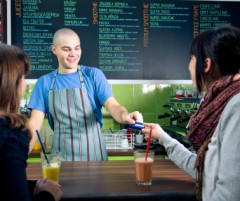The Right Way to Reward Your Customers
Guest post by John Carvalho
 In today’s fragmented marketplace, true brand loyalty seems like a hard thing for companies to acquire and harder still for companies to hang onto. Yet, it’s arguably ever more important.
In today’s fragmented marketplace, true brand loyalty seems like a hard thing for companies to acquire and harder still for companies to hang onto. Yet, it’s arguably ever more important.
Loyalty programs are a key tool for doing so. From a psychological standpoint, allowing consumers to earn and use perks lead to feelings of status, stronger brand-consumer relationships, increased word-of-mouth, and increased purchasing intentions.
But, by inviting customers to form connections with you that are emotional and not merely transactional, you open yourself to both the potential for great brand-building success but also serious failure. Customers who have emotionally invested in earning and receiving perks for each cup of coffee they drink or shirt they dry-clean can react with surprisingly strong feelings of disappointment if you let them down. See, for example, The Fatal Flaw in Loyalty Programs (And How to Minimize Damage). Research soon to be published in an upcoming edition of the Journal of Consumer Research highlights another reason why providing preferential treatment to customers can be a double-edged sword.
Earned vs Unearned Treatment
Preferential treatment can be loosely broken down in two types: earned (Starbucks Gold cards), and unearned (a free hotel upgrade as you check-in, “millionth customer” giveaways). In general, one would think consumers like receiving all preferential treatment, all the time, no matter what. Not so, says this research.
The Social Aspect
Humans are social beings. In public, we look to those around us for clues about how to feel and behave. So, in a series of inventive in-field studies, researchers set out to figure out whether social dynamics would change how people felt about earning rewards. It’s a study well worth reading in its entirety if you have time. However, the single most important takeaway for Neuromarketing readers: receiving unearned preferential treatment in the presence of others increased social discomfort and reduced customers’ satisfaction.
What does this mean?
Consumers like being rewarded, but they also care what other people think about them. As marketers, we might think the former trumps the latter, but in reality, that doesn’t always appear to be the case. In follow-up research, social discomfort kept customers from fully appreciating unearned preferential treatment even when it was awarded after they won a seemingly random “sweepstakes.”
When we surprise our consumers, let’s find ways to do it privately. McDonalds’ Monopoly pieces can be played in the store or taken home. Kiehl’s, a luxury skincare brand, infrequently has “surprise” sales- when it does, though, it provides the appropriate redemption codes through opt-in emails, removing the exchange from public. By not making the surprise reward public, we’ll be able to ensure that the only emotion they feel when they receive it is happiness.

John,
Michael E Gerber also talks about this in the EMyth and I agree with your assessment. Try too hard and your make the customer uncomfortable.
The best I’ve seen is when a company remembers me, solves my problem quickly, or brings a smile to my face. That is real interaction!
Thanks.
Steve Freeman
Steve,
Exactly the case. Authenticity may be an overused buzzword when it comes to marketing messages or consumer interactions, but day-to- day authenticity matters more than “try-hard” surprises.
Cheers,
John
Hi John,
Very interesting articles and study. But what about the different personas? Is it tested by different personas because I believe a more spontaneous person will react differently (more positive because the preferential treatment is also spontaneous). What are your thoughts?
Amanda
Exactly the case. Authenticity may be an overused buzzword when it comes to marketing messages or consumer interactions
Amanda,
It’s an interesting question. I’m not sure it would make a tremendous difference, in this case. The discomfort in this situation stems out of external SOCIAL comparison- not necessarily internal discomfort- in fact, a later study found that discomfort could be mediated if, essentially, those in the vicinity congratulated the recipient of the preferential treatment.
That being said, certainly personality could play a role, but my guess is it would be more around confidence, or an idea in psychology known as locus of control (essentially, the extent to which people perceive causation as a result of personal behaviors or external events).
John
[…] The Right Way to Reward Your Customers Creating brand loyalty and an emotional connection with a customer is something every company […]
[…] programs that are earned are better. Customers prefer to feel that they earned the reward. Also, points that are guaranteed and can be used to choose a reward are better than a chance to […]